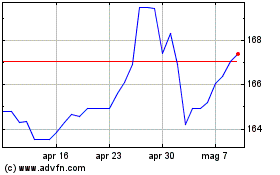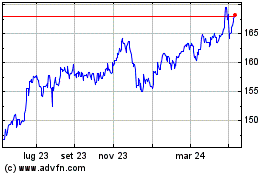Euro Falls Amid Growth Concerns
24 Marzo 2023 - 9:42AM
RTTF2
The euro depreciated against its major counterparts in the
European session on Friday, as European shares fell on renewed
concerns about the health of the banking sector despite assurances
from U.S. regulators.
Treasury Secretary Janet Yellen's pledge to safeguard all
deposits without congressional approval failed to reassure
investors.
Flash survey results from S&P Global showed that Eurozone
and German manufacturing PMIs fell more-than-expected in March.
Eurozone manufacturing PMI dropped to a 4-month low of 47.1 in
March from 48.5 last month. The reading was forecast to fall to
49.
German manufacturing PMI fell to 44.4 in March from 46.3 in
February. This was the lowest reading since May 2020.
The U.K.'s FTSE 100 dropped 1.9 percent, while France's CAC 40
and Germany's DAX fell 2.2 percent each.
The euro dropped to 3-day lows of 1.0712 against the greenback
and 1.7272 against the kiwi, from its prior highs of 1.0838 and
1.7376, respectively. The next likely support for the euro is seen
around 1.05 against the greenback and 1.70 against the kiwi.
The euro weakened to a 2-day low of 0.8777 against the pound and
a 1-week low of 0.9848 against the franc, after rising to 0.8826
and 0.9939, respectively in early deals. The currency may find
support around 0.86 against the pound and 0.97 against the franc,
should it drops again.
The euro fell to 2-day lows of 1.6138 against the aussie and
1.4766 against the loonie, retreating from its early highs of
1.6251 and 1.4870, respectively. The euro is poised to challenge
support around 1.58 against the aussie and 1.46 against the
loonie.
The euro was down against the yen, at a 4-day low of 139.06. On
the downside, 135.00 is possibly seen as its next support
level.
Grafico Cross Euro vs Yen (FX:EURJPY)
Da Mar 2024 a Apr 2024

Grafico Cross Euro vs Yen (FX:EURJPY)
Da Apr 2023 a Apr 2024
